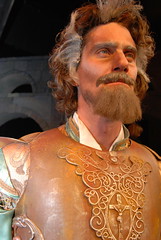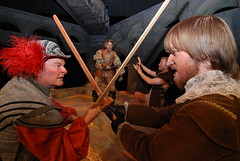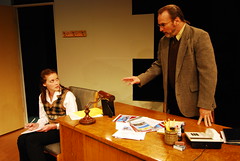two articles about reviewing
blogs.guardian.co.uk/theatre/2008/05/the_role_of_theatre_reviews.
html#comments
Should reviews include five-star ratings? Is it barely possible that a review might be more interesting than the artwork it sets out to review?
Should reviews describe or prescribe? Is a synthesis of journalistic (in the moment, what was it like, consumer-advocate reporting) and academic criticism (long-term view, cultural context, placing a particular show within the performance tradition) possible or even desirable?
ALSO:
www.salon.com/books/feature/2008/05/22/critics/
Makes the point that academics, with all the "Death of the Author" stuff about how everything is culturally implicated and therefore value judgments are impossible, are undermining the entire critical enterprise.
With the rise of sites like Rotten Tomatoes and the laying-off of movie critics across the land and the rise of legions of blogger-critics, isn't it really true that nobody needs or wants critics anymore?
We can all be critics.
Or is there a conflation here? It's certainly true that everyone is entitled to his or her opinion.
But is it NECESSARILY elitist to suggest that not all opinions are equally valid?
Americans, with our democratic traditions, tend to distrust the so-called experts. Who are those pointy-headed guys,anyway? Who are they to tell me what I should or should not like?
But then what if they're not TELLING me? I mean, if my opinions conflict with theirs, I can start my own blog, right?







